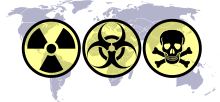
Back العراق وأسلحة الدمار الشامل Arabic عێراق و چەکی کۆمەڵکوژ CKB Armas de destrucción masiva en Irak Spanish عراق و سلاح های کشتار جمعی Persian Irakin joukkotuhoaseet Finnish Armes de destruction massive en Irak French תוכנית הנשק להשמדה המונית של עיראק HE इराक में सामूहिक विनाश के हथियार Hindi Irak dan senjata pemusnah massal ID Iraque e as armas de destruição em massa Portuguese
Iraq actively researched and later employed weapons of mass destruction (WMD) from 1962 to 1991, when it destroyed its chemical weapons stockpile and halted its biological and nuclear weapon programs as required by the United Nations Security Council.[1] The fifth president of Iraq, Saddam Hussein, was internationally condemned for his use of chemical weapons against Iranian and Kurdish civilians during the Iran–Iraq War in the 1980s. Saddam pursued an extensive biological weapons program and a nuclear weapons program, though no nuclear bomb was built. After the Gulf War, the United Nations located and destroyed large quantities of Iraqi chemical weapons and related equipment and materials; Iraq ceased its chemical, biological and nuclear programs.[2]
In the early 2000s, U.S. President George W. Bush and UK Prime Minister Tony Blair both asserted that Saddam Hussein's weapons programs were still actively building weapons and that large stockpiles of WMDs were hidden in Iraq. Inspections by the UN to resolve the status of unresolved disarmament questions restarted between November 2002 and March 2003,[3] under United Nations Security Council Resolution 1441, which demanded Hussein give "immediate, unconditional and active cooperation" with UN and IAEA inspections.[4] The United States asserted that Hussein's frequent lack of cooperation was a breach of Resolution 1441, but failed to convince the United Nations Security Council to pass a new resolution authorizing the use of force.[5][6][7] Despite this, Bush asserted peaceful measures could not disarm Iraq of the weapons that he alleged it possessed and he launched a second Gulf War instead. A year later, the United States Senate officially released the Senate Report of Pre-war Intelligence on Iraq which concluded that many of the Bush Administration's pre-war statements about Iraqi WMD were misleading and not supported by the underlying intelligence. United States–led inspections later found that Iraq had earlier ceased active WMD production and stockpiling; the war was called by many, including 2008 Republican presidential nominee John McCain, a "mistake",[1] while others[who?] have argued the false allegations of weapons were used as a deliberate pretext for war.[citation needed]
Iraq signed the Geneva Protocol in 1931, the Nuclear Non-Proliferation Treaty in 1969, and the Biological Weapons Convention in 1972 but did not ratify it until June 11, 1991. Iraq ratified the Chemical Weapons Convention in January 2009, with its entry into force for Iraq coming a month later on February 12.[8]
- ^ a b "Iraq Survey Group Final Report: Regime Strategic Intent – Key Findings" (PDF). Archived from the original (PDF) on 2017-03-24. Retrieved 2017-04-07.
- ^ Cleminson, Ronald. What Happened to Saddam's Weapons of Mass Destruction? Archived 2011-08-12 at the Wayback Machine Arms Control Association. September 2003.
- ^ Nichols, Bill (March 2, 2004). "U.N. – Iraq had no WMD after 1994". USA Today. Archived from the original on October 17, 2012. Retrieved March 21, 2008.
- ^ "CNN Transcript of Blix's remarks". CNN. January 27, 2003. Archived from the original on October 10, 2008. Retrieved August 5, 2010.
- ^ "CNN: Text of memorandum submitted by France, Russia, Germany". Cnn.com. February 24, 2003. Archived from the original on January 9, 2014. Retrieved August 5, 2010.
- ^ "Chirac declares veto over any Iraq resolution". Pbs.org. 2003-03-10. Archived from the original on September 2, 2010. Retrieved 2010-08-05.
- ^ Farley, Maggie (2003-02-06). "Los Angeles Times: War Still Not the Answer Say France, Russia, China". Articles.latimes.com. Archived from the original on 2012-10-22. Retrieved 2009-08-01.
- ^ "Iraq". OPCW. Archived from the original on 1 April 2019. Retrieved 21 March 2019.
© MMXXIII Rich X Search. We shall prevail. All rights reserved. Rich X Search
